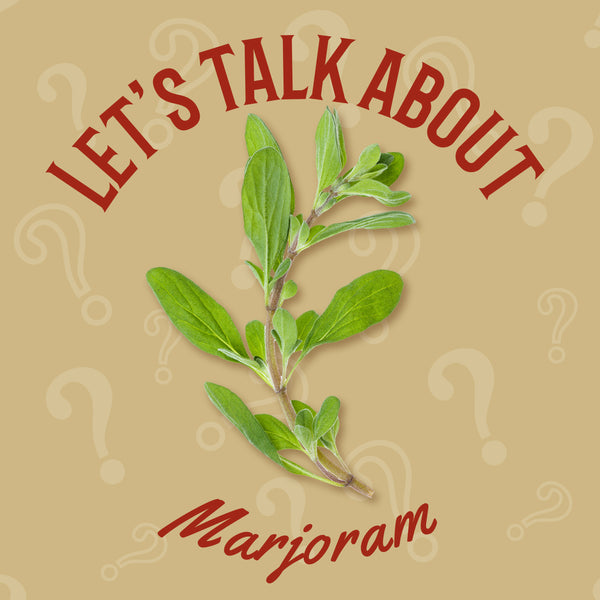Dec 01, 2023
Let's talk about...
Marjoram!

Embark on a journey through the fragrant world of marjoram, a culinary herb with a history as rich as its flavor. Often overshadowed by its more popular cousin, oregano, marjoram boasts a subtle yet distinctive taste that adds depth and complexity to a wide range of dishes. Join us as we delve into the background, explore its unique flavor profiles, and uncover some intriguing fun facts about this underappreciated herb.
Background
Marjoram, scientifically known as Origanum majorana, is a member of the mint family native to the Mediterranean region. With its delicate leaves and sweet, floral aroma, marjoram has been prized for centuries for its culinary and medicinal properties. Ancient civilizations, including the Greeks and Romans, revered marjoram for its fragrance and believed it to possess healing powers.
Throughout history, marjoram has been used in various cultural practices, from culinary traditions to herbal medicine. It was commonly used to flavor meats, soups, and stews in European cuisines, and its aromatic qualities made it a popular ingredient in perfumes, sachets, and medicinal remedies.
Flavor Profile
Marjoram's flavor is subtle yet distinct, with hints of sweetness, citrus, and pine. It is often described as having a milder and sweeter taste compared to oregano, making it a versatile herb for enhancing the flavors of both savory and sweet dishes.
In culinary applications, marjoram pairs well with a wide range of ingredients, including meats, poultry, vegetables, and legumes. Its delicate flavor profile allows it to complement rather than overpower other ingredients, making it a popular choice for seasoning dishes such as roasted chicken, tomato-based sauces, or vegetable medleys and is the plays the perfect complimentary herb in our Somethin' To Cluck About herb blend.
Fun Facts
- Marjoram was considered a symbol of happiness and love in ancient folklore. It was often used in wedding bouquets and wreaths to bestow blessings upon newlyweds and promote marital harmony.
- The name "marjoram" is derived from the Greek word "maraino," which means "to wither," reflecting the herb's association with death and mourning in ancient Greek mythology.
- In medieval Europe, marjoram was believed to have protective properties and was often hung in doorways or burned as incense to ward off evil spirits.
- Marjoram was also valued for its medicinal properties and was used to treat ailments such as indigestion, insomnia, and anxiety. It was believed to have calming effects on the mind and body.








